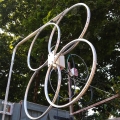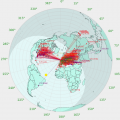jks
About
- Username
- jks
- Joined
- Visits
- 36,263
- Last Active
- Roles
- Member, Administrator, Moderator
- Points
- 640
Reactions
-
v1.360+: DRM extension now available
When one channel is running DRM today's v1.367 release allows the other channels to connect (audio and waterfall), with the limitation that they cannot use any extensions. This is because the Beagle cpu processing requirements of most extensions might be beyond the point needed to support DRM. This condition might be relaxed in the future as more improvements to the DRM code efficiency is made.
You can limit the number of non-DRM channels allowed to connect with a new setting available on the DRM sidebar of the admin "extensions" tab.
The code to detect and enforce these conditions was tricky to write and it is quite likely that there are problems remaining. -
v1.360+: DRM extension now available
Yes, in the next release the DRM button will be properly disabled (greyed-out) when DRM is disabled.
Yes, SAM (synchronous AM) is a placeholder. I figured people were going to be upset enough when I changed the mode buttons (they were) that I better only do it once. Even if it meant using placeholder(s) for anticipated future changes. Depending on your browser if you hover over SAM a tooltip should say "not yet implemented". -
v1.360+: DRM extension now available
v1.362 fixes a few memory leaks and crashes and makes some minor user interface improvements.
As with other extensions you can make a bookmark that selects DRM and an existing station in the menu, e.g.
The cached build mechanism is still not working, so this update will take around 35 minutes.my_kiwi.com:8073/?ext=drm,3965 (brings up RFI on 3965 kHz) -
v1.360+: DRM extension now available
You won't get audio unless the signal is good enough that the "Main service channel" (MSC) block goes green. If the broadcaster is using 64-QAM for MSC (and to a lesser extent 16-QAM for SDC) then the signal will be less robust against selective fading, multi path etc. This is a trade-off to allow a higher bitrate (e.g. "20.96 kbps" as shown above) which allows better codec performance and stereo vs mono etc. There are other factors too that I'm only beginning to understand. -
v1.360+: DRM extension now available
You won't get audio unless the signal is good enough that the "Main service channel" (MSC) block goes green. If the broadcaster is using 64-QAM for MSC (and to a lesser extent 16-QAM for SDC) then the signal will be less robust against selective fading, multi path etc. This is a trade-off to allow a higher bitrate (e.g. "20.96 kbps" as shown above) which allows better codec performance and stereo vs mono etc. There are other factors too that I'm only beginning to understand.





